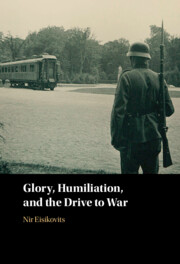Book contents
- Glory, Humiliation, and the Drive to War
- Reviews
- Glory, Humiliation, and the Drive to War
- Copyright page
- Dedication
- Reviews
- Contents
- Acknowledgments
- Introduction
- Part I Glory
- Chapter 1 A Short History of Glory
- Chapter 2 A Theory of Glory
- Chapter 3 Our Ambivalence about Glory
- Part II Humiliation
- Part III Glory and Humiliation: War’s Two-Stroke Engine
- Conclusion
- Bibliography
- Index
Chapter 2 - A Theory of Glory
from Part I - Glory
Published online by Cambridge University Press: 19 December 2024
- Glory, Humiliation, and the Drive to War
- Reviews
- Glory, Humiliation, and the Drive to War
- Copyright page
- Dedication
- Reviews
- Contents
- Acknowledgments
- Introduction
- Part I Glory
- Chapter 1 A Short History of Glory
- Chapter 2 A Theory of Glory
- Chapter 3 Our Ambivalence about Glory
- Part II Humiliation
- Part III Glory and Humiliation: War’s Two-Stroke Engine
- Conclusion
- Bibliography
- Index
Summary
This chapter develops a rudimentary theory of glory. Glory is a particularly elevated form of honor, a kind of “super recognition.” It is more exclusive and longer lasting than honor, and it is typically connected with promises of immortality and an “upgrade” of one’s reputation. We distinguish between political (or Periclean) and personal (or Achillean) glory. Personal glory is competitive by definition, political glory is not. We also discuss the scope of the term and suggested that determining the proper objects of glory (military, political, cultural, or even everyday pursuits) turns on the social role the concept is supposed to play. The status and role of glory change during different stages of a conflict. Early on (typically before a war starts) glory helps motivate people to fight for a cause. During the conflict, the preoccupation with glory usually fades among those who actually do the fighting, and after the conflict, the question of bestowing glory becomes subject to bureaucratic and social decisions. Furthermore, we argue that often those who actually do the fighting are not the ones who get glorified. We note the tension between positing that someone has a duty to fight and the practice of glorifying them for fulfilling that duty, and we also argue that glory is subject to both internal and external explanations. We conclude by tracing the relationship between glory and death, and examining the normativity of both Periclean and Achillean glory.
- Type
- Chapter
- Information
- Glory, Humiliation, and the Drive to War , pp. 31 - 53Publisher: Cambridge University PressPrint publication year: 2025

